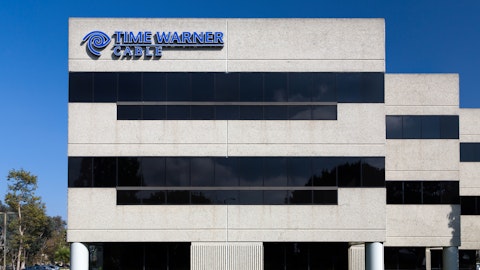In his most recent letter to investors, David Einhorn, the manager of Greenlight Capital, expressed his opinion regarding the potential future of both Netflix Inc (NASDAQ:NFLX) and Micron Technology Inc (NASDAQ:MU), saying “we don’t think the movie is over”. At first glance it might seem that Einhorn ambiguously showed respect towards the future prospects of Netflix, the large online streaming network, but don’t let the standalone phrase fool you, as in the context, he meant completely the opposite. Einhorn concluded his long-term vision regarding Netflix and Micron with a clear statement that he and his colleagues in Greenlight Capital expect Micron to be valued at more than Netflix in a few years’ time, despite the latter currently sporting a market cap of more than double that of the former. A quick glance at the most recent figures indicates that Micron’s market cap stands at $19.06 billion, while Netflix is valued at $41.09 billion. In this case, Einhorn’s approach looks more than just contrarian (which he himself admits it looks), however, Micron’s massive $3.7 billion of year-to-year net profits leave it quite a few chances in any “relative value battle” with Netflix, as that service can barely boast about its $240 million in profits and rising licensing costs. Keeping all of this in mind, we would like to dig a bit deeper into Greenlight Capital’s opinion about both stocks, review the recent trends in the companies, and show what other prominent investors in our extensive database think about Netflix and Micron. But, first, let’s start with a quick introduction to Greenlight Capital.

David Einhorn’s Greenlight Capital is a New York-based hedge fund with a strong track record of almost 20 years. His fund specializes mostly in technology stocks, as Einhorn had around 45.3% of the value of his $7.91 billion public equity portfolio allocated towards that sector. Among the general public, Einhorn is famously known for identifying poorly performing stocks, which he uses as targets for short-selling. Over the last quarter, Greenlight Capital returned negative 1.5%, bringing the fund’s first half of 2015 loss to 3.3%, which is significantly worse than the S&P 500’s 1.2% gains over the same period. It’s also uncharacteristically poor results for one of the most successful money managers of the past two decades. But let’s set aside the dull figures, as it’s pointless to judge such long-term oriented and successful industry players as Einhorn over that short of a time span, and switch to our analysis instead.
Follow David Einhorn's Greenlight Capital
We don’t just track the latest moves of funds. We are, in fact, more interested in their 13F filings, which we use to determine the top 15 small-cap stocks held by the funds we track. We gather and share this information based on 16 years of research, with backtests for the period between 1999 and 2012 and forward testing for the last 2.5 years. The results of our analysis show that these 15 most popular small-cap picks have a great potential to outperform the market, beating the S&P 500 Total Return Index by nearly one percentage point per month in backtests. Moreover, since the beginning of forward testing in August 2012, the strategy worked brilliantly, outperforming the market every year and returning 135%, which is more than 80 percentage points higher than the returns of the S&P 500 ETF (SPY) (see more details).
Following an 8% increase in its holding of Micron Technology Inc (NASDAQ:MU), Greenlight Capital finished the first quarter of the year with 33.55 million shares valued at $910.20 million. During the first six months of the year the stock of this highly cyclical semiconductor giant has plummeted by 49.7%, losing about 30.56% during the second quarter alone. The investment in this company turned out to the worst performing one in the portfolio of Greenlight Capital, according to Einhorn’s letter. David regrets missing “the turn of the cycle”, when long production lead periods do not leave any flexibility for the changing demand. At the same time, he believes in a brighter future for DRAM and NAND, where Micron has redirected some of its capacities, which, combined with a more predictable industry, suggest a potentially good investment, especially at its current valuation. Andreas Halvorsen’s Viking Global occupied the second place in the list of the largest stockholders of Micron Technology Inc (NASDAQ:MU) in our database, after Einhorn himself, owning 31.15 million shares worth $844.99 million.
Coming back to Netflix Inc. (NASDAQ:NFLX), on April 15, when the company announced its first quarter results, something really surprising happened: the analysts expected the earnings to come in at $0.63, while Netflix reported significantly lower earnings of just $0.36, which should be extremely negative news, shouldn’t it? Of course, it should, but not in the case of Netflix, whose price reaction was completely the opposite, since after the announcement its shares went up by 12%, and finished the second quarter among the top gainers in the S&P 500. In the letter, Einhorn explains it in a way that Netflix “pushed its promises into the distant future, with grand hopes for the decade starting in 2020”, meaning higher spending today makes investors believe that they will eventually transfer into an increase in future profits. Einhorn also took a shot at Netflix’s vaunted original series House of Cards, saying “Further, we had just finished watching season three of NFLX’s leading original content show, House of Cards, which appeared to be scripted to compete with Ambien.” Ambien of course, is a leading insomnia medication.
Needless to say, Einhorn did not report owning any shares of Netflix Inc. (NASDAQ:NFLX) as of his most recent 13F filing, believing that it’s overvalued and part of a select group of companies that get preferential treatment among investors for their “exciting stories”, while not being held accountable for current performance. Tesla Motors Inc (NASDAQ:TSLA) is arguably another of these stocks (our words, not Einhorn’s). Coatue Management, headed by Philippe Laffont, topped the list of the largest shareholders of Netflix Inc. (NASDAQ:NFLX) that we track, finishing the first three months of the year with 1.76 million shares valued at $734.69 million. Netflix is up by a guady 107.21% year-to-date
Disclosure: None




